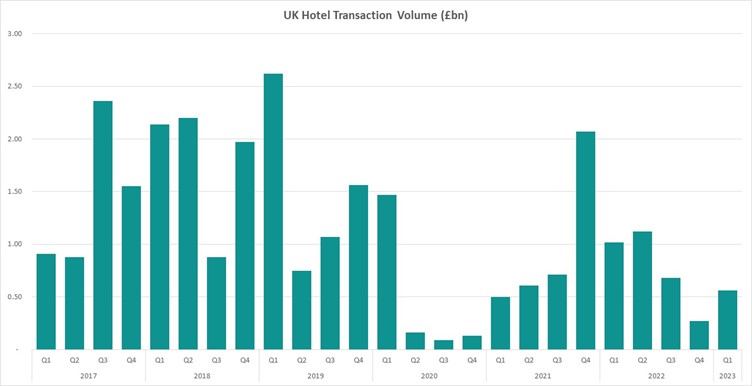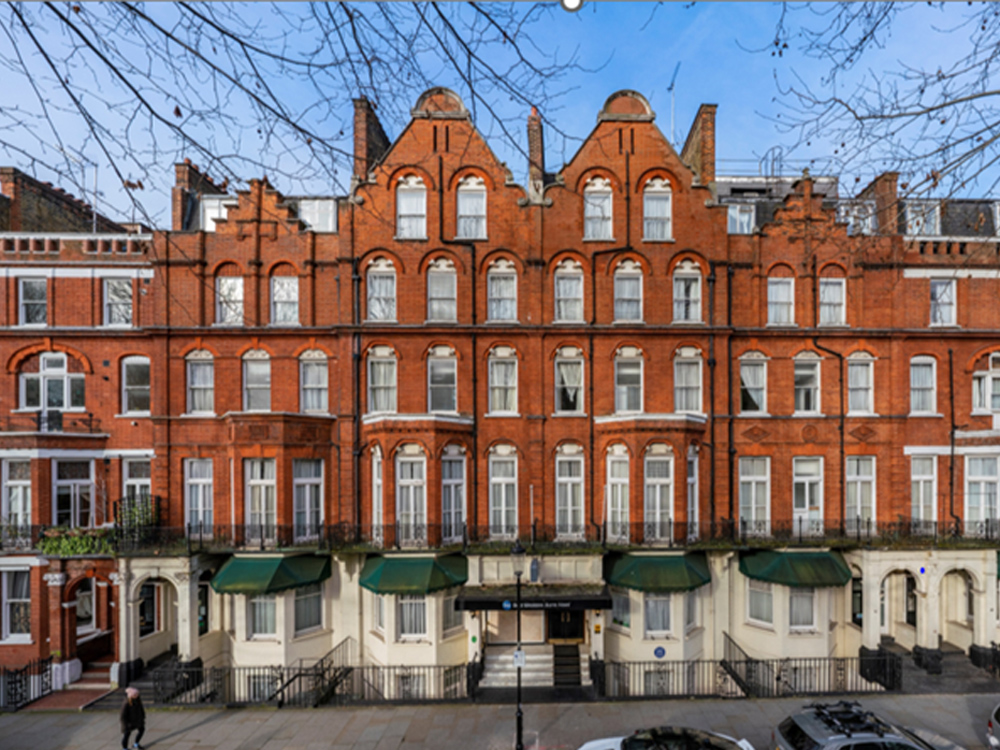Tentative but encouraging start to year for UK Hotel Transactions
UK Hotel transaction volumes reached £0.6 billion for the first quarter of the year.
5 minutes to read
After a muted end to 2022, transactional activity during the first three months of the year more than doubled, compared to the previous quarter, but with the deal volume remaining significantly below the five-year quarter average of £1.2 billion.

The deals completed were almost exclusively single asset transactions, with a dearth of portfolio activity, but with a 50:50 split between regional UK and London completed sales. UK corporate investors were most active in terms of sellers, accounting for over 40% of transactions, whilst a further 23% of the activity was attributed to investment sales completed by UK institutional investors.
Those buyers most active were experienced hotel owners with a profound understanding and knowledge of the UK hotel sector, be it focused hotel investment groups or corporate hotel owner-operators. These investors, focused on active ownership and long-term value creation accounted for 55% of transactional activity in the first quarter of 2023, with much of their activity targeting opportunities in key regional destinations. The Fattal Group’s acquisition of the Grand Hotel Brighton for £60 million (with a further £16 million of investment planned) and the acquisition by Pandox of The Queens Hotel in Leeds for £53 million are two such examples, whereby healthy balance sheets and divestments elsewhere in their portfolios have freed up capital to support ongoing profitable and opportunistic expansion.
Operationally, the UK hotel market continues to perform strongly, with investors buoyed by RevPAR returning to, or exceeding pre-pandemic levels. Investment in the sector has been fuelled by robust levels of domestic travel, comprising strong leisure, and improving corporate demand, which have yielded often longer and more profitable stays. The sale of Macdonald Ansty Hall, Aubrey Park Hotel and Raithwaite Country Retreat, deals completed in the first quarter and where Knight Frank advised the seller, are examples of value-add opportunities, where the appeal of destination and experience-led retreats which focus on well-being and sustainability are becoming increasing sought after.

The Burns Hotel, London. Knight Frank advised the seller, on the sale the freehold interest of a 104-bedroom Georgian town house hotel, located in the heart of Earls Court, at a guide price of £35 million.
The London hotel market has also rebounded strongly, and as a renowned hub for international travel, the opportunity sought from the ongoing recovery in long-haul travel is a further catalyst for investment. Five sizeable transactions took place during the first three months of the year, including the £55 million sale of The Covent Garden Hotel, acquired by Firmdale from CBRE Investment Management; Dalata Hotel Group’s £44 million purchase of a newly built, 192-room hotel in Seven Sisters; and the £42 million sale of the long-leasehold interest of the Holiday Inn Regents Park Hotel, divested by CBRE Investment Management. Single asset deals which transacted in London as a going concern averaged approximately £430,000 per room.
Despite interest rates continuing to rise and inflation now expected to fall more slowly than the initial Bank of England forecast, investment appetite in the hotel sector is expected to remain resilient, with London and key gateway cities remaining key targets. Some big-ticket, quality assets are currently being marketed for sale, including The Sheraton Grand Hotel in Edinburgh for sale at over £370,000 per room, which is set to become Scotland’s largest single asset to transact since 2018. Meanwhile, following the recent sale of the Hoxton hotels in Amsterdam and Paris and capitalising on the strong demand for design-led, lifestyle hotels, a £450 million sale of the three London-based Hoxton hotels is currently progressing, with Ennismore expected to retain the management.
Whilst the current economic environment is forcing certain investors to retrench, for others this time presents renewed pickings for identifying and securing new investment opportunities. Despite pricing remaining sensitive, several sizeable single assets hotels are currently undergoing a competitive marketing process, along with a regional portfolio of hotels, all of which are likely to complete later in the year.
Meanwhile, lucrative home-office contracts are having a material structural impact on the UK hotel market, in terms of both the occupational and investment market. According to Knight Frank's research, we estimate that across the whole of the UK, some 350 hotels totalling approximately 35,000 rooms are currently being used to house asylum seekers and refugees or commissioned by the public sector for social housing. This reduction in a market’s total capacity of bedroom stock is supporting the sector’s recovery - with barriers for re-entry deemed relatively high - facilitating the growth in room rates in markets where quality hotel accommodation is either in short supply and/or in high demand. Meanwhile, the dynamics of the investment market are also being impacted by these Home-Office contracts with far fewer distressed or forced sales currently taking place.
“With interest rates remaining high, access to finance and the cost of debt will continue to make certain investors more reticent. Yet, large amounts of capital remain to be deployed, and with investors taking a long-term view, the outlook for increasing levels of investment into the sector is positive, with potential for both portfolio and big-ticket single asset deals to take place later in the year.”
Philippa Goldstein, Senior Analyst – Hotels & Leisure at Knight Frank
“Having traded strongly over the past 12 months, we are beginning to see more sizeable, prime located assets, benefit from a competitive sales process, demonstrating resilience in pricing. Due to the ongoing rise in the cost of debt, the requirement for higher returns from certain buyer profiles provides an opportunity for other investors to gain a foothold into the market.
Whilst there continues to be a continuing lack of distress in the market, increased activity from owners actively managing their portfolios is apparent. Owners are now more willing to realise the value of their assets, to free up capital to support the increased burden of debt, or for reinvestment through repositioning and ESG improvements, or for continued expansion.”
Henry Jackson, Head of Hotel Agency and Partner at Knight Frank